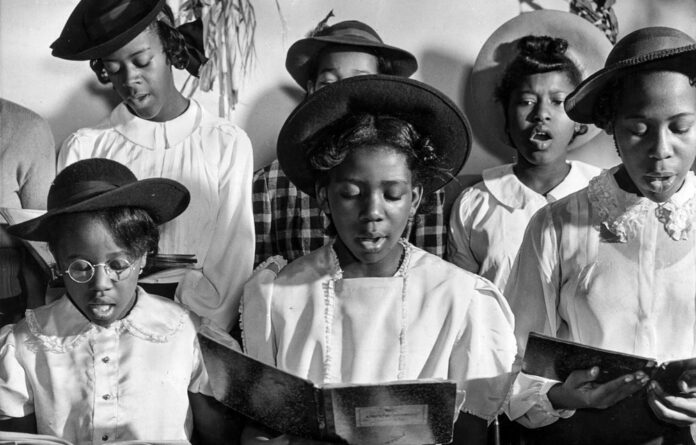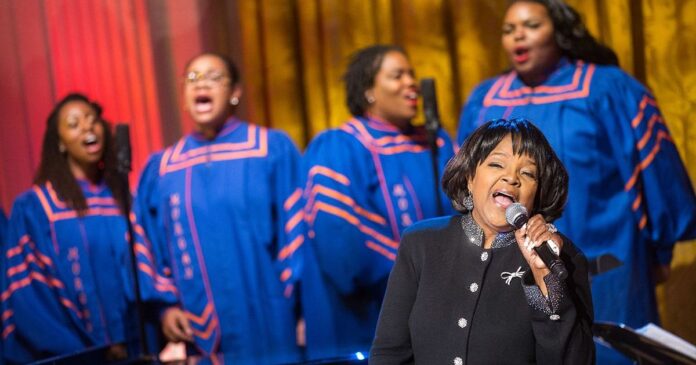Gospel music has a rich and vibrant history that has had a profound impact on mainstream culture. With its roots deeply intertwined with African-American spiritual traditions, it has evolved over time to become a powerful force, influencing not only religious worship but also popular genres and social movements.
Historical Roots: Exploring the Origins
To understand the impact of gospel music, we must first trace its origins. This genre emerged from the fusion of African rhythms, spirituals, hymns, and blues during the late 19th and early 20th centuries. It found its roots in the African-American churches, where passionate and emotive singing and hand-clapping became an integral part of religious worship. It provided solace and hope to a community that faced immense challenges and discrimination.
Influence on African-American Culture

Gospel music became a powerful cultural expression for the African-American community, serving as a means of preserving their identity and celebrating their resilience. It provided a platform for self-expression, allowing individuals to share their joys, sorrows, and aspirations. Through songs, African-Americans found strength, unity, and a voice that transcended the boundaries of racial oppression.
Role in the Civil Rights Movement
During the Civil Rights Movement in the 1950s and 1960s, gospel music played a pivotal role in inspiring and mobilizing activists. Songs like “We Shall Overcome” and “Ain’t Gonna Let Nobody Turn Me ‘Round” became anthems of hope and resilience. It provided solace and encouragement to those fighting for equality and justice, and it became a driving force behind the movement’s progress.
Formation of Popular Genres
This genre not only influenced religious worship but also had a significant impact on the development of popular genres. The energetic and soul-stirring melodies of gospel music found their way into secular music, shaping the sounds of rhythm and blues (R&B), soul, funk, and even rock and roll. Artists like Ray Charles, Aretha Franklin, and Sam Cooke, who started their careers in gospel music, brought elements of the gospel into mainstream popular music, creating a bridge between the church and the charts.
Impact on Popular Artists and Songs

Numerous popular artists have been influenced by gospel music throughout their careers. From Elvis Presley’s rendition of gospel classics to Whitney Houston’s powerful gospel-inspired ballads, it has left an indelible mark on some of the most celebrated artists and iconic songs in history. The passion, soulfulness, and vocal techniques of the genre continue to inspire and shape the artistry of musicians across genres.
Crossover Success: Gospel Artists in the Mainstream Music Industry
In recent years, the impact of gospel music on mainstream culture has become even more apparent as several artists have achieved remarkable crossover success. These talented individuals, such as Kirk Franklin, Mary Mary, and Tasha Cobbs Leonard, have transcended the traditional boundaries of the gospel music industry and have gained widespread recognition in the mainstream scene. Their extraordinary achievements include not only capturing the hearts of millions of listeners but also receiving prestigious accolades like Grammy Awards.
What sets these artists apart is their ability to collaborate with mainstream musicians, seamlessly blending gospel elements with popular genres. By doing so, they have not only expanded the reach of this genre but also introduced it to entirely new audiences who may not have been exposed to its uplifting and soul-stirring sounds before. This crossover success serves as a testament to the evolving nature of gospel, showcasing its versatility and its profound ability to resonate with diverse listeners across various musical preferences.
The recognition and accolades these artists have received demonstrate the growing acceptance and appreciation of gospel music within the mainstream music industry. Their contributions have helped break down barriers, challenging preconceived notions about the genre and its relevance in contemporary music. Through their powerful performances and heartfelt lyrics, these artists have managed to capture the essence of gospel music while infusing it with a modern touch that resonates with a broader audience.
The Choir Phenomenon: From Churches to Concert Halls
Gospel choirs have become a cultural phenomenon, captivating audiences worldwide with their powerful performances. Choirs are not only a fixture in churches but have also found a place in concert halls, festivals, and even popular talent shows. The exuberant harmonies, spirited vocals, and infectious energy of the choirs create an uplifting and transformative experience, transcending cultural and religious boundaries.
Influence on Contemporary Christian Music
This genre has had a profound influence on contemporary Christian songs, shaping the sound, lyrical content, and worship practices. Contemporary Christian artists often draw inspiration from the heartfelt and emotive nature of the gospel, infusing their songs with elements of gospel to create a powerful worship experience. It has expanded the boundaries of Christian music, allowing it to resonate with a broader audience.
Film, Television, and Popular Media

The influence of gospel music extends beyond the realm of music itself. It has found its way into films, television shows, and popular media, serving as a powerful soundtrack for storytelling and emotional expression. Whether it’s the soul-stirring performances in movies like “Sister Act” or the presence of this genre in television series like “Greenleaf,” gospel music has become an integral part of popular culture, amplifying the impact of its message.
Innovation and Adaptation
As we look to the future, gospel continues to evolve, embracing new styles, technologies, and influences. Artists are pushing the boundaries of the genre, incorporating elements of hip-hop, electronic, and other contemporary genres. The future of gospel music lies in its ability to adapt and innovate while staying true to its roots, ensuring its relevance and impact on mainstream culture for generations to come.
Conclusion
In conclusion, gospel music has had a profound and enduring impact on mainstream culture. From its historical roots in African-American churches to its crossover success and influence on popular genres, this genre has shaped the way we worship, express ourselves, and address social issues. Its transformative power continues to resonate with audiences worldwide, bridging gaps and inspiring change. As it evolves and adapts, it remains a testament to the enduring spirit of hope, resilience, and faith.









